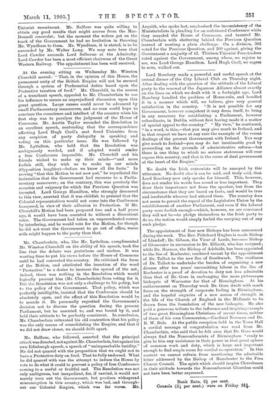At the evening sitting on Wednesday Mr. Winston Churchill moved
: " That, in the opinion of this House, the permanent unity of the British Empire will not be secured through a system of Preferential duties based upon the Protective taxation of food." Mr. Churchill, in the course of a trenchant speech, appealed to Mr. Chamberlain to use his influence to secure an unprejudiced discussion upon this great question. Large causes could never be advanced by small Parliamentary manceuvres, and no man could hope to convince the conscience and intellect of the country when his first step was to paralyse the judgment of the House of Commons. Mr. Austin Taylor seconded the Resolution in an excellent speech, contending that the correspondence affecting Lord Hugh Cecil's seat freed Unionists from any suspicion of party disloyalty in speaking and voting on this particular issue. He was followed by Mr. Lyttelton, who held that the Resolution was ambiguously worded, and if adopted would render a free Conference impossible. Mr. Churchill and his friends wished to make up their minds—" and more foolish still, they wish us to make up our minds (Opposition laughter)—before we know all the facts." In moving "that this Motion be not now put," he repudiated the insinuation that the Government had recourse to a Parlia- mentary manoeuvre ; on the contrary, this was precisely the occasion and exigency for which the Previous Question was invented. Lord George Hamilton, who strongly demurred to this view, asserted that it was childish to pretend that the Colonial representatives would not come into the Conference hampered, in view of their adhesion to Protection. If Mr. Churchill's Motion had been proposed two and a half years ago, it would have been assented to without a dissentient voice. The Government had taken an unprecedented course by interfering, and he would vote for the Motion, for though he did not want the Government to go out of office, worse evils might happen to the party than that.










































 Previous page
Previous page